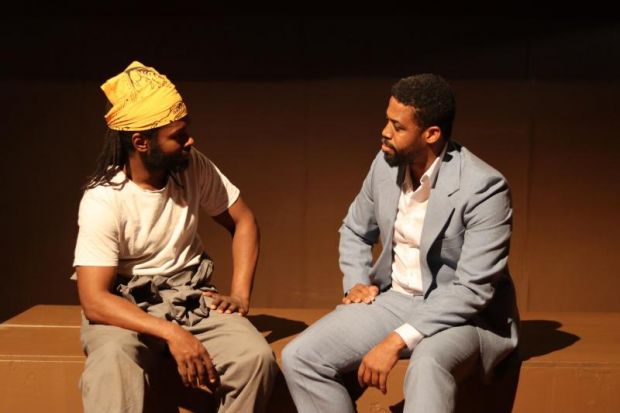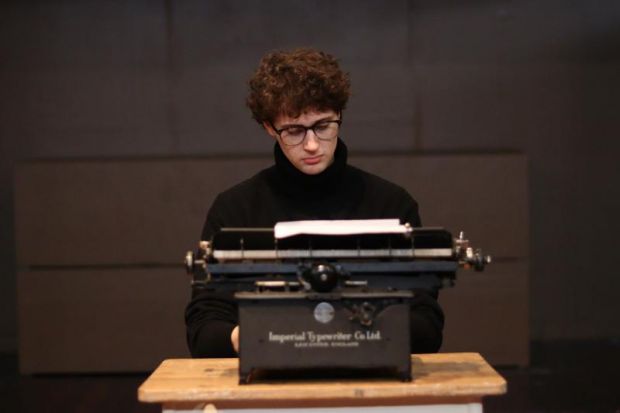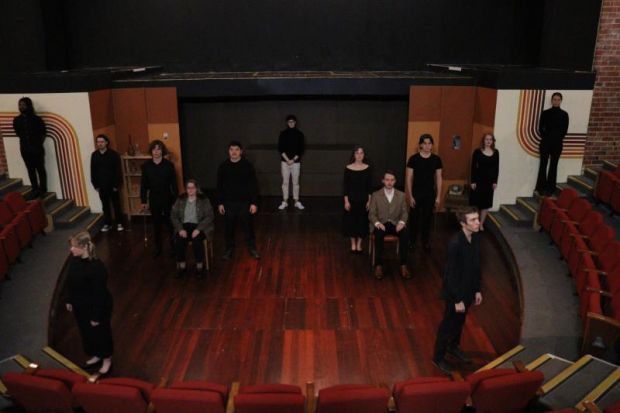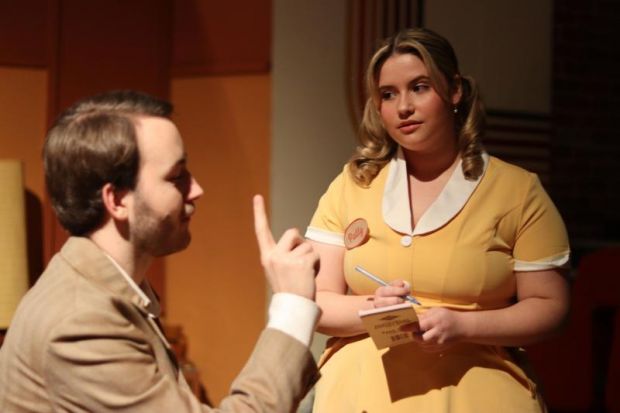Breakfast of Champions
A man sits at a manual typewriter, more in thought than hitting the keys, though the occasional tat-tat-tattat-tat punctuates our pre-show conversations. It’s a smart device to draw us into the world we’re about to experience on stage, which is then pierced when the lights go down and the man addresses us directly.
Based on the novel by Kurt Vonnegut, Jr, Breakfast of Champions is a multi-layered play about an author, who writes about an author, Kilgore Trout, and Dwayne Hoover, a Pontiac car salesman. At the start, these two have nothing in common, and the play narrates the events leading up to their first, fateful meeting in the ordinary American town of Midland City.

The play’s style is narrative – literally: most of the story is told through a single voice, telling us not just context, but explaining what is happening. Director Taylor Fernandez keeps our interest through varying the voice across the large cast of fourteen, with the majority of those taking different roles in each scene. It’s an unusual style to tell, rather than show, but it’s effective in navigating the different levels of story.
Robert Baulderstone is The Author, in a performance that’s cool and understated, but all the better for it. He even looks like Vonnegut, hinting the autobiographical links to the story. Beatrice Blackwell’s stony-faced Trout is hilarious whilst keeping a straight face, their character oblivious to his writing success. Tommy Raets looks the part as the successful car salesman who is slowly going insane with chemical imbalances in his brain. Hoover is successful only financially: his wife committed suicide, and he’s estranged from his gay son, and Raets’ facial expressions are convincingly bewildered as he tries to understand where he is and what does it all mean?

That’s a question never far from the audience, but Fernandez does well to signpost our journey, coupling changes of scene with big shifts in lighting and direction of voice. The Little Theatre's amphitheatre-style is used well, with performers on stage, on the aisle steps, walking around behind the audience, immersing us in these worlds.
Thematically, the story uses a broad brush to paint issues of sexuality, racism, violence, abuse, and suicide, but where it draws more strongly is in the meaning of success, and the falsehood of the ‘American Dream’. In particular, the strongest thread is that real, feeling humans are vastly outnumbered by ‘robots’ (literally, for the sci-fi author) – and Egan’s adaptation isn’t afraid to make us uncomfortable when reframing slavery in these terms. He reminds us this isn’t just history; it’s a contemporary issue, and is even more relevant fifty years after the book was originally written.

The ensemble cast both perform and act as stage crew, moving Thomas Brogden’s simple yet effective set of small tables and chairs, and two large blocks that can be a bed, a bar, or whatever they need to be. The ensemble works well together, sliding into the different characters through costume changes. They are all great performers, but two standouts are Charlie Milne, who is brilliant in telling more of his story through his physicality; and Airlie Windle, a devastating Francine, who is seductive as Hoover’s lover, and horrified when on the other end of his verbal and physical violence. Again, it’s her face that says as much as her words when she’s in the spotlight.
Phoenix Scriver’s lighting does some good work in creating shadows and focusing the audience, and Jehosheba Manoa’s sound design supports the action, though it sometimes distracts with its sudden introductions. The projection of Vonnegut’s illustrations (included in the original novel) truly adds to the performances beneath them, both framing and adding humour to the serious commentary from the stage. When the different levels of fiction merge in a hotel bar, it brings each thread of story together brashly and destructively, but it’s a neat way to close the circle of character and creator.

This is bold, courageous, and experimental theatre – a rewarding display of new, emerging, and established talent, that will challenge your own brain chemistry for long after the house lights come up.
Mark Wickett
Subscribe to our E-Newsletter, buy our latest print edition or find a Performing Arts book at Book Nook.

